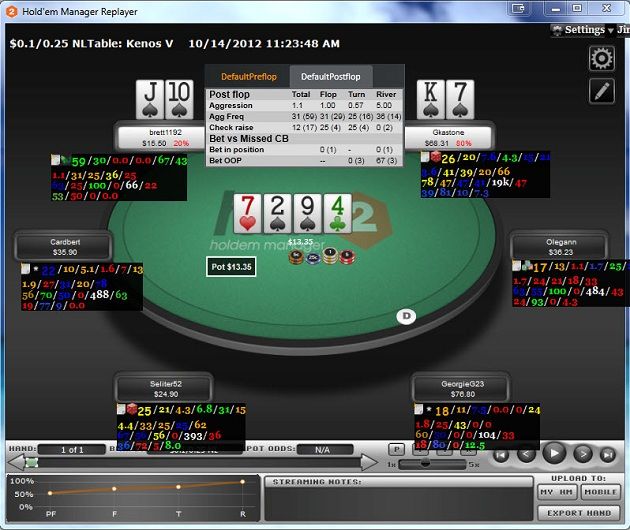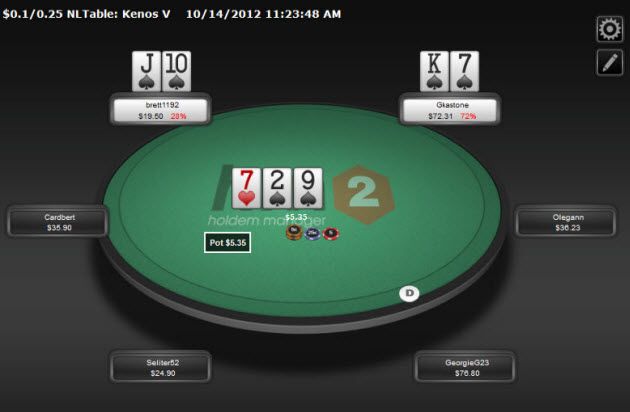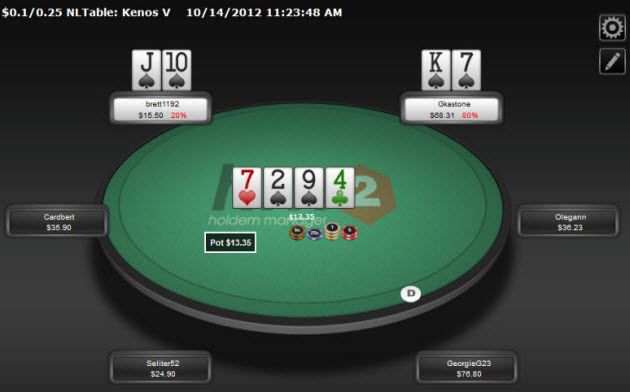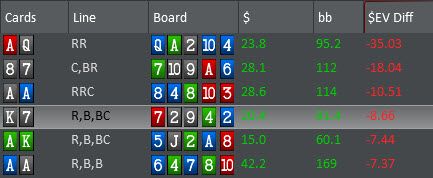Value betting with medium poker hands is discussed in the second episode of the poker strategy video series. One of the first lessons in online poker is value betting with strong hands, especially against bad players and calling stations. How about value betting with hands that have medium showdown value like second pair? How about calling down with a medium hand a check-raise of a fish? That may not sound as great strategy, but we will be surprised to find out we are in front most of the times! Like in the poker hand I’m showing in this video.
I’m sitting at the same table I was playing at the episode 1! The opponent is right next to me and in this hand he is at the Under-The-Gun position (UTG). After 65 hands his VPIP is more than 50%, while his aggression factor is zero! An interesting statistic that will come in handy regarding the specific poker hand is that he almost never folds on flop and actually never on turn! The opponent has serious leaks that lead to a very bad Won $ at Showdown percentage (25%). Find the optimal poker stats here.
They open 3 times the big blind and I look down at King Seven offsuit. I rarely play this hand from that position, but given the action I’ll be trying to isolate the fish and play a pot against him. That is why I 3bet them, preventing from other regulars to take part in the hand. Calling would also give better odds for them to call in position with drawing and medium hands and in case someone attacked with a 3bet, I would not be able to defend with such a medium poker hand.
The isolation 3bet worked and after villain’s check it’s up to me to either check behind or continue betting. The flop has given me second pair and a flush draw, increasing my pot equity considerably. There are two issues if I elect to check behind. First, I offer a free card to villain that might help them and I’m also giving up the chance to take down a nice pot with a lot of dead money into it. Betting on the other hand will allow me to remain aggressive, potentially lead my opponent to make more mistakes and finally conceal my hand, as that is the same exact action I would be taking in case I held Aces, Kings or Queens. Villain calls and turn is a blank.
His call didn’t set any alarms on, since he only folds 25% when facing a continuation bet! But from what hands could I be possibly taking value from? Most probably drawing hands like straight draws (T8, J8, JT), worse flush (and combo) draws (QJs, QTs, J8s, JTs) and perhaps some overcards (AQ, AJ, AT, KQ), which they can’t fold. Besides, they only fold 33% preflop against a 3bet, meaning that these hands are likely to be in their 3bet-calling range! Since the turn didn’t change anything, I don’t want them to draw out against me and continue taking value against some of the mentioned hands. Shoving there is also an option since his stack is close to the pot’s size, otherwise a smaller bet than the one I make would induce some bluff-raising. Yet they opt to check-raise all-in but I’m not going anywhere, given their check-raise stats!

In case I’m behind (set, overpair or a nine) I still have plenty of outs. It turns out that I was actually in front during the whole hand, when they showed JTs for a straight and flush draw! My pot equity was 72% on flop…

…and it increased to 80% on turn!

Should I have checked behind on flop or even worse on turn, I would have given up my pot equity and wouldn’t have maximized the value I could generate against the specific poker player. They would also fold to any river bet, since they would have missed their draws and maybe only a Jack or Ten would be enough to call me down.

This poker hand explains why we should always take fish to valuetown! Even with medium hands we should try to isolate and play many pots against bad players, as we can extract plenty of value from them. We should also be not afraid to call down their aggressive moves. They apparently don’t know how to fold chasing draws and attacking with no folding equity! My EV-adjusted profit of this hand was about $11, although I did make 20 dollars. Too bad the villain left the table, as soon as they lost the hand.


